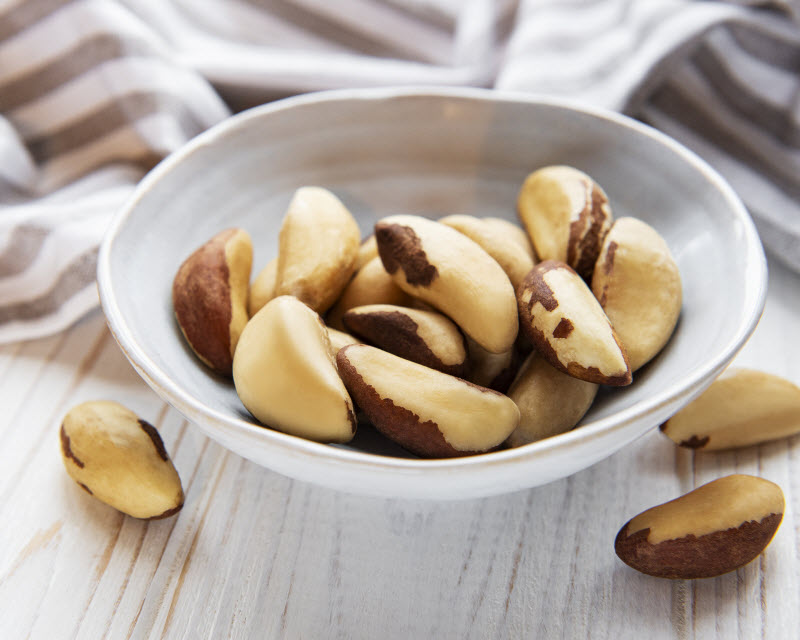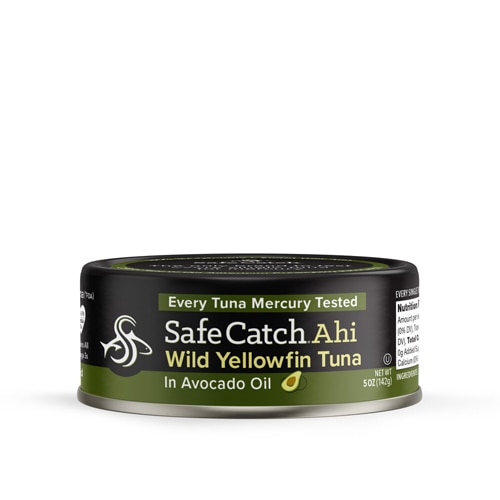[vc_row][vc_column][vc_column_text]If you’re not entirely sure what
selenium is, you’re in good company. Not many people have heard of selenium, a trace mineral involved with several bodily processes, including thyroid function and immune response. Along with many other
essential minerals, we need to get sufficient amounts of selenium from the foods we eat.
Here’s what to know about the role selenium plays in the body and how to make sure you’re getting enough (but not too much).

What is selenium?
Selenium is a mineral our bodies use to make proteins called selenoproteins, which we require to create DNA, protect against cell damage, and fight off infections. Selenoproteins are also involved with
thyroid and reproductive functions.
Selenium is among the many
micronutrients that we need in tiny amounts to support normal bodily processes, like immune function and the production of
thyroid hormones. Most people get sufficient amounts from the foods they eat.
What are the selenium benefits I need to know?
Ongoing research suggests that selenium levels may affect health in several ways.
1. Selenium combats oxidative stress†
Selenium is an
antioxidant, a compound that helps to reduce inflammation and
oxidative stress, a condition a linked to DNA damage, aging, and cancer. Studies suggest that selenium’s anti-inflammatory effect may benefits
cardiovascular health and
cognitive health.
†
2. Selenium is associated with cellular health†
A
meta analysis found that high levels of selenium obtained from food were associated with a lowered risk of several different types of cancer, though no similar protective effect was found with selenium supplementation.
†
3. Selenium supports thyroid function†
Selenium is involved with healthy functioning of the thyroid gland, and low levels of selenium have
been associated with increased prevalence of thyroid issues.
Research is exploring selenium for addressing Hashimoto’s disease, an autoimmune condition affecting the thyroid.
†
4. Selenium supports the immune system†
Selenium is one of many nutrients involved with
immune function.
Studies suggest that selenium deficiency may impair immune response.
Research is exploring selenium’s potential to help address asthma symptoms.
†
How much selenium do I need?
The recommended daily allowance (RDA) of selenium is 55 micrograms. Pregnant and lactating women need slightly more (60 and 70 micrograms).
Insufficient intake of selenium may play a role in the health conditions mentioned above, but data from
National Health and Nutrition Examination Surveys suggest that most Americans get more than enough selenium in their daily diets. People with HIV or undergoing kidney dialysis may be at risk for low selenium because of issues with absorption caused by these conditions.
†
The tolerable upper intake level (UL) of selenium is 400 micrograms. Too much selenium can lead to selenium toxicity, resulting in symptoms that include hair loss, nausea, dizziness, tremors, heart attacks, and kidney failure.
What’s the best way to get selenium?
Like other essential nutrients, selenium is best obtained from foods, though because levels of the mineral in soil varies widely, it can be difficult to know for sure how much selenium foods contain. In the United States, most soils contain ample selenium, but in other parts of the world, that’s not always the case. In regions with low selenium levels, those following
plant-based diets may have trouble getting enough selenium.
You will sometimes find selenium included in multivitamins, but it’s generally not thought necessary to supplement with selenium if you eat a varied diet.
†
The best selenium food sources
Brazil nuts (68-91 mcg per nut, 544 mcg per ounce)
Oysters (131 mcg per 3-ounce serving)
Yellowfin tuna (92 mcg per 3-ounce serving)
Mussels (76 mcg per 3-ounce serving)
Lobster (62 mcg per 3-ounce serving)
Kamut (55 mcg per cup cooked grain)
Clams (54 mcg per 3-ounce serving)
Halibut (47 mcg per 3-ounce serving; grouper, salmon, sardines, and other fish are also good sources)
Shrimp (40 mcg per 3-ounce serving)
Enriched pasta (37 mcg per 3-ounce serving)
Pork, beef, and turkey (around 30 mcg per 3-ounce serving)
Chicken (22 mcg per 3-ounce serving)
Cottage cheese (20 mcg per 3-ounce serving)
Sunflower seeds (19 mcg per 3-ounce serving)
Brown rice (19 mcg per 3-ounce serving)
Eggs (15 mcg per egg)
You can also get selenium in smaller amounts from foods like mushrooms, milk, yogurt, fortified cereal, whole wheat bread, oatmeal, and legumes like beans and lentils.
Getting enough (but not too much) selenium
Brazil nuts are an especially rich source of selenium, though you need to take care not to eat too many or you’ll exceed the maximum recommended daily amount. One Brazil nut contains all the selenium you need daily, and if you’re getting selenium from other sources, you can easily get more than you need if you eat Brazil nuts every day. Some
nut butter blends also contain brazil nuts, so be aware of this source of selenium if you enjoy one of these blends regularly.
If you take a multivitamin, check whether it contains selenium. Some multis contain above the recommended daily allowance, so you may want to discuss with a doctor whether you’re getting an appropriate amount of selenium if yours falls into this category. If you’re getting plenty of selenium from food sources, they may advise switching to a multivitamin without added selenium.
†
†These statements have not been approved by the Food and Drug Administration. These products are not intended to diagnose, treat, cure or prevent disease.[/vc_column_text][/vc_column][/vc_row][vc_row][vc_column][vc_text_separator title="Featured Products" border_width="2"][vc_row_inner equal_height="yes" content_placement="middle" gap="35"][vc_column_inner width="1/3"][vc_single_image image="165637" img_size="full" alignment="center" onclick="custom_link" img_link_target="_blank" css=".vc_custom_1679154664107{padding-right: 7% !important;padding-left: 7% !important;}" link="https://www.vitacost.com/safe-catch-ahi-wild-yellowfin-can-tuna"][/vc_column_inner][vc_column_inner width="1/3"][vc_single_image image="165635" img_size="full" alignment="center" onclick="custom_link" img_link_target="_blank" css=".vc_custom_1679154680351{padding-right: 7% !important;padding-left: 7% !important;}" link="https://www.vitacost.com/woodstock-brazil-nuts-raw"][/vc_column_inner][vc_column_inner width="1/3"][vc_single_image image="165636" img_size="full" alignment="center" onclick="custom_link" img_link_target="_blank" css=".vc_custom_1679154696934{padding-right: 7% !important;padding-left: 7% !important;}" link="https://www.vitacost.com/crown-prince-whole-oysters-packed-in-water"][/vc_column_inner][/vc_row_inner][/vc_column][/vc_row]




